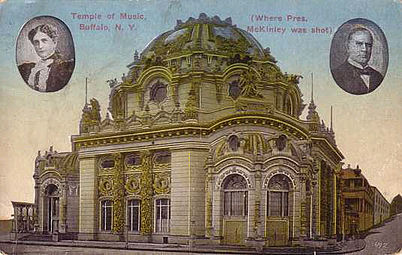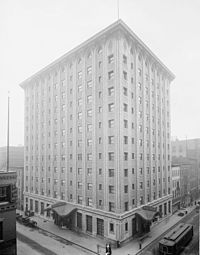Esenwein & Johnson
| Type | Private company |
|---|---|
| Industry | Architecture |
| Founded | 1898 |
| Founder | August Esenwein James A. Johnson |
| Defunct | c. 1930 |
| Headquarters | Buffalo, New York |
Esenwein & Johnnson was an architectural firm of Buffalo, New York.
Firm history[]
It was a partnership of German-born August Esenwein (1856-1926) and James A. Johnson (1865-1939). The partnership was started in 1898;[1] the firm designed "many of Buffalo's outstanding buildings including the Lafayette High School and the General Electric Building". [2]
A number of their works are listed on the U.S. National Register of Historic Places.[3] In 2007, the Buffalo History Museum, then called the Buffalo and Erie County Historical Society, held an exhibition of their work entitled, "Art Nouveau and Other Expressions: Rediscovering the Architecture of Esenwein & Johnson."[4]
Works[]
Works include (with attribution):
- Ansonia Building (1906), 712-726 Main Street (at W. Tupper), Buffalo, New York (Esenwein & Johnson)[5]
- Automobile Club of Buffalo, 1910-1911, Clarence, New York (Esenwein & Johnson), NRHP-listed [6]
- Bancroft Hotel, built 1912, 50 Franklin St. Worcester, Massachusetts (Esenwein & Johnson), NRHP-listed[3]
- Buffalo Museum of Science, built in 1929, (Esenwein & Johnson)
- The Calumet (1906), 46-58 West Chippewa St., Buffalo, New York (Esenwein & Johnson), NRHP-listed[7]
- Colonial Flats and Annex, 399-401 Delaware Ave., Buffalo, New York. Designed the "Annex" (1900), (Esenwein & Johnson), NRHP-listed.
- Dnipro Ukrainian Cultural Center, originally Fraternal Order of Orioles Headquarters (1914), 562 Genesee St., Buffalo New York (Esenwein & Johnson) [8]
- The Durant, 607 E. 2nd Ave. Flint, Michigan (Esenwein & Johnson), NRHP-listed[3][9]
- Hotel Utica in Utica, New York
- Iroquois Hotel in Buffalo, New York, Built 1889 and demolished in 1940 (known as the Gerrans Building at that time) [10]
- Fosdick-Masten Park High School,aka Masten Park High School (1914), Masten Ave. and E. North St., Buffalo, New York (Esenwein & Johnson), NRHP-listed[3][11]
- General Electric Tower, aka Niagara-Mohawk Building and Electric Tower, 535 Washington St., Buffalo, New York (Esenwein & Johnson), NRHP-listed[12][13]
- Louis Kurtzman House (1907-1909), 24 Lincoln Parkway, Buffalo, New York (Esenwein & Johnson)[14]
- Lafayette High School, 370 Lafayette Ave., Buffalo, New York (Esenwein & Johnson), NRHP-listed[3]
- Hotel Lafayette (1902), 391 Washington St., Buffalo, New York (Esenwein & Johnson), NRHP-listed
- Linde Air Products Factory (1910, 1911 Additions), 155 Chandler St., Buffalo, New York (Esenwein & Johnson), NRHP-listed
- The Niagara, 201 Rainbow Blvd. Niagara Falls, New York (Esenwein and Johnson of Buffalo, NY), NRHP-listed[3]
- , 10 N. Main St. Akron, Ohio (Esenwein & Johnson), NRHP-listed[3]
- Robert Keating Root Building (1912), 70-86 West Chippewa Street, Buffalo, New York (Esenwein & Johnson)[15]
- Sinclair, Rooney & Co. Building (1909-1911), 465 Washington St., Buffalo, New York, NRHP listed[16]
- John Sinclair House (1909-1911), 94 Jewett Parkway, Buffalo, New York (Esenwein & Johnson), part of the NRHP-listed Parkside East Historic District[17]
- Hotel Statler (original, c. 1908), Buffalo, New York (Esenwein & Johnson)[18]
- Taylor Signal Company-General Railway Signal Company (1902-1906), Buffalo, New York (Esenwein & Johnson)[19]
- Temple of Music (1901), Buffalo, New York (Esenwein & Johnson)[20]
- United Office Building (1929), 222 1st Street, Niagara Falls, New York (James A. Johnson), NRHP-listed[21]
- M. Wile and Company Factory Building, 77 Goodell St., Buffalo, New York (Esenwein & Johnson), NRHP-listed
A more complete list of works is found on the Buffalo Architecture and History web site.[22]
Gallery[]

Temple of Music (where President William McKinley was assassinated)
General Electric Tower

Frank A. Dudley Residence

Iroquois Hotel

Hotel Statler (original)
References[]
- ^ "Bios - Eisenwein & Johnson". Buffalo Architecture and History.
- ^ Claire L. Ross (March 1983). "National Register of Historic Places Registration: Fosdick-Masten Park High School". New York State Office of Parks, Recreation and Historic Preservation. p. 6. Retrieved 2009-06-14. See also: "Accompanying nine photos".
- ^ a b c d e f g "National Register Information System". National Register of Historic Places. National Park Service. July 9, 2010.
- ^ "Art Nouveau and Other Expressions: Rediscovering the Architecture of Esenwein & Johnson". Buffalo History Museum. 2007.
- ^ "Ansonia Building". Buffalo Architecture and History.
- ^ "National Register of Historic Places Listings". Weekly List of Actions Taken on Properties: 8/06/12 through 8/10/12. National Park Service. 2012-08-17.
- ^ "The Calumet Building". Buffalo Architecture and History.
- ^ "Buffalo History Museum Architecture Map". Archived from the original on 2014-12-06. Retrieved 2015-01-06.
- ^ "History". The Durant, Flint, Michigan. Archived from the original on 2014-08-14. Retrieved 2012-09-28.
- ^ "Iroquois Hotel". Buffaloah.com.
- ^ "From Masten Park to City Honors: The 1914 Building - Exterior". Buffalo Architecture and History.
- ^ "National Register of Historic Places Registration Form for General Electric Tower". New York State Office of Parks, Recreation and Historic Preservation. July 25, 2008.
- ^ "Electric Tower: Project Profile". The Electric Tower. Retrieved 23 February 2020.
- ^ "Louis Kurtzman House". Buffalo Architecture and History.
- ^ "Robert Keating Root Building". Buffalo Architecture and History.
- ^ "National Register of Historic Places Listings". Weekly List of Actions Taken on Properties: 2/01/16 through 2/05/16. National Park Service. 2016-02-12.
- ^ "John Sinclair House". Buffalo Architecture and History.
- ^ "Hotel Statler (1905-1908)- later Hotel Buffalo". Buffalo and Erie County Historical Society.[permanent dead link]
- ^ ""Cultural Resource Information System (CRIS)"". New York State Office of Parks, Recreation and Historic Preservation. Archived from the original (Searchable database) on 2015-07-01. Retrieved 2015-11-01. Note: This includes Martin Wachadlo and Francis R. Kowsky (February 2014). ""National Register of Historic Places Registration Form: Taylor Signal Company-General Railway Signal Company"" (PDF). Retrieved 2015-11-01. and Accompanying photographs
- ^ "Temple of Music". Buffalo Architecture and History.
- ^ "United Office Building". Buffalo Architecture and History.
- ^ "Online Buildings - Esenwein & Johnson". Buffalo Architecture and History.
- Defunct architecture firms based in New York (state)
- Architects from Buffalo, New York
- Companies based in Buffalo, New York
- Design companies established in 1898
- Design companies disestablished in 1930
- 1898 establishments in New York (state)
- 1930 disestablishments in New York (state)
- Art Nouveau architects
- Historicist architects












